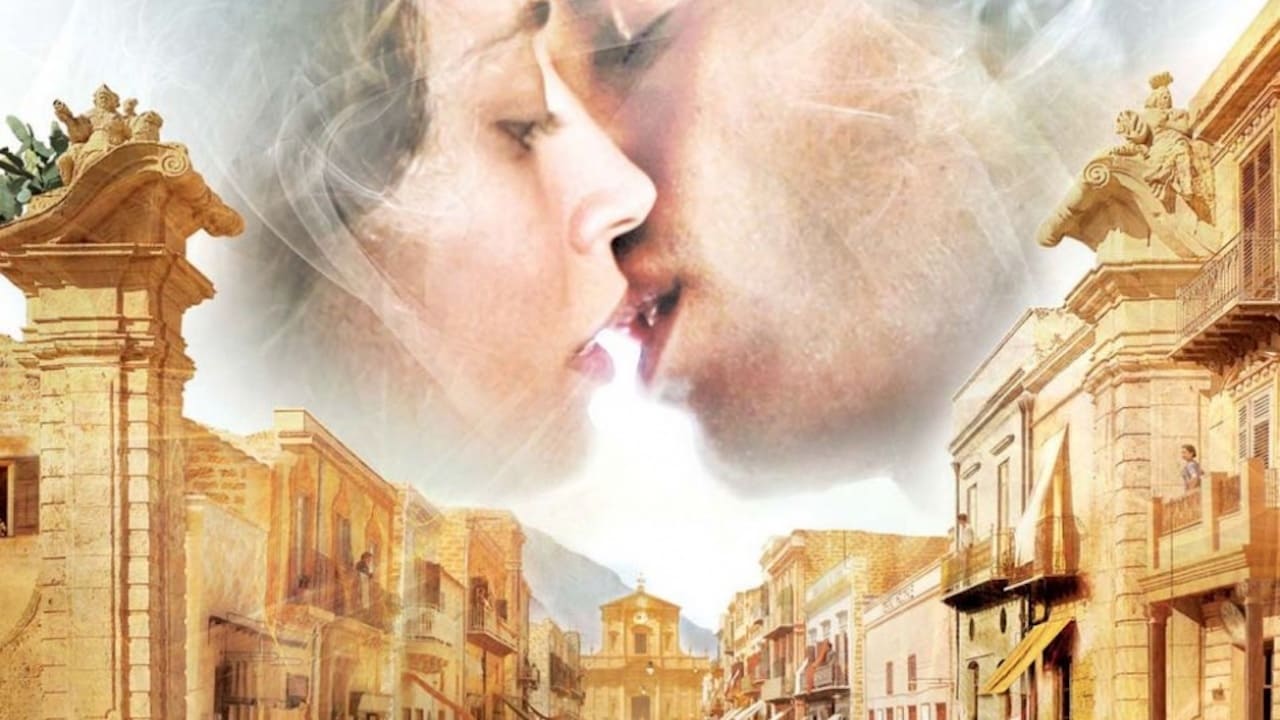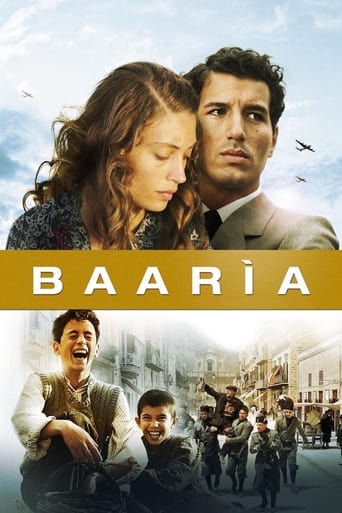

This movie reminded me of other Tornatore's movies as "Nuovo Cinema Paradiso" and "Malena" because of its setting in Sicily and because of one of the director's landmarks like reminiscing childhood with all its main events and characters. I would say that it's a good movie because it portrays well Sicily, with its breath-taking landscapes and with its characters that properly express the temper of Sicilian people. However, compared to other of his movies, especially the aforementioned "Nuovo Cinema Paradiso", Tornatore doesn't add anything to his picture of Sicilian culture, he rather delivers a lower quality plot compared to other of his movies. Plus, the movie is in some parts boring and too long.
... View MoreBagheria, a Sicilian city, it is at the center of this Italian epic film conceived and directed by Giuseppe Tornatore, a native of he city. We were under the impression "Baaria" might have been a mini series, abridged for the screen by its creator, but we realize this was a project too close to Mr. Tornatore's heart. He has fared much better with other films, among them, "Cinema Paradiso" and "Malena", just to mention two of his best efforts.The film follows a poor family from the 1930s for a few decades. At its core, the Torrenuova family, a local family, the director must have known well enough to tell their story, although it could be his own people he decided to weave this tale around his recollection of them. One thing is clear where Mr. Tornatore's affection lies. Like most of his fellow Italian colleagues, they have always leaned toward communism, although Italian style, where everyone can declare alliances for the oppressed while wearing the latest fashions from Italian designers.Basically, what comes out of this 150 minutes film is perhaps the reason why most people from the area turned to communism out of their hatred for Mussolini and his oppressive fascist regime before WWII. The Torrenuova family had trouble making ends meet, sometimes going hungry during those years of the conflict. Peppino, the youngest son, is made to go helping a shepherd, as well as milking a cow for the people in town. His involvement with the political ideas were easy for him to follow, after all, he grew up getting the ideology from all angles.The film has an episodic feeling. Ideas come and go at a rapid pace, without being fully developed. We realize how things worked in that part of Italy. The powerful landowners controlled large portions of the arable land. These people were threatened by the advocates of agrarian reforms, and improvement for the peasants, so it comes as no surprise Peppino was not able to bring the justice he wanted to his beloved city and the rest of Sicily during his lifetime.The musical score is by the great Ennio Morricone, almost a sure thing to help any film, but unfortunately, at times, it overwhelms the action. Enrico Ludici photographed the area concentrating in its main street that is seen ad nauseum throughout the film, as well as some the rough territory in the mountains that overlook the city. There is an enormous cast with some good Italian actors. Francesco Scianna who plays Peppino Torrenuova as an adult and a middle age man does a fine job.One could only wish Mr. Tornatore better luck with his next work, perhaps a smaller, less ambitious project in which he could show his talent.
... View MoreMy summary line is actually a title of German movie, re-quoted to get the title of this one in (original title "Maria, He ..."). Both play in Italy, but that's it with the comparisons. Tornatore has the upper hand, not that you could really compare those movies. The one is an easy comedy fare (in the vein of the big fat Greek wedding output) and the other one is a mysterious look at a family and the 20th century as a whole if you will! Many unknown actors have been cast here, and if a somewhat famous face does appear it is only for a small role. Something that the director did deliberately. Although the real star might again be the music. As with almost all the films Morricone has scored, he has done a phenomenal job yet again.The movie as it is, is high standard drama, that as most of those movies who try to go through many years of a life, lack substance at moments. And while the female lead has quite a few scenes, there are still many question marks left at the end, where her motivations came from. Speaking of the end: It might baffle a few people, but it certainly won't be something you'd expect to happen. Well I didn't at least.
... View MoreGiuseppe Tornatore, the director of Cinema Paradiso (1989), one of the greatest films ever made, has made Baaria, a 150-minute long drama that spans more than six decades in the life of the film's lead character, Peppino Torrenuova. Based on memories of the Sicilian village the Italian director was born into, Baaria is an autobiography of sorts that documents the lives of people who have been affected by social and political revolutions of the last century, and as seen through the eyes of the Torrenuova family.Shot in Italy and Tunisia in which a full set of a Sicilian village was built from scratch, Baaria is visually captivating. Tornatore creates a feeling of "vibrant nostalgia" by having most of the scenes drenched in bright yellow as if memories of the past have been lighted up by a powerful flashlight. The film may be attractive to look at, but the lack of emotional power undermines the filmmaker's attempt to recreate Cinema Paradiso all over again.The most glaring flaw of Baaria that limits its emotional power is the uninspired editing rendered. It is ironic that even with such a long running time, the film has inadequate character development. The editing is such that the film is broken up into about twenty sequences of similar length and is merged together through the fade out-fade in technique. Thus, it is like watching a slideshow of beautiful images.The film is coherent enough for the average viewer to comprehend, but the narrative that drives the core of the film remains inhibited, as if it is involuntarily hiding behind the image. And when the narrative seems to pick up steam in some parts, and things get quite interesting, Tornatore breaks it all apart again. And again. It is quite frustrating on the viewer to say the least.Ennio Morricone once again creates a beautiful score that is slow and mournful. It is, however, let down by the film's lack of interest in connecting with the viewer. Interestingly, Baaria is a film in which the sum is more than the parts that add up to it. The last fifteen minutes finally reveals the scope of Tornatore's vision for Baaria, which until then seems like an enlarged postcard with stunning images, but without the words that would reveal the sender's emotions.While he seeks to look back into the past, he also wishes to equate a lifetime of memories to a split-second afterthought, highlighting the fact that time passes too quickly for us to appreciate each moment on its own, of which the medium of cinema can only suggest but not replicate. Through some heavy symbolism and instances of magical realism, Tornatore makes us aware of the medium at work.Baaria, for all of its editing shortcomings, appears to transcend them by the time the end credits roll. Unfortunately, the parts that make up the film still linger unsatisfactorily in the mind. Baaria is Tornatore's love letter to his hometown. It is done with lots of love, but sadly, it just doesn't come out as such on the big screen.SCORE: 6.5/10 (www.filmnomenon.blogspot.com) All rights reserved!
... View More